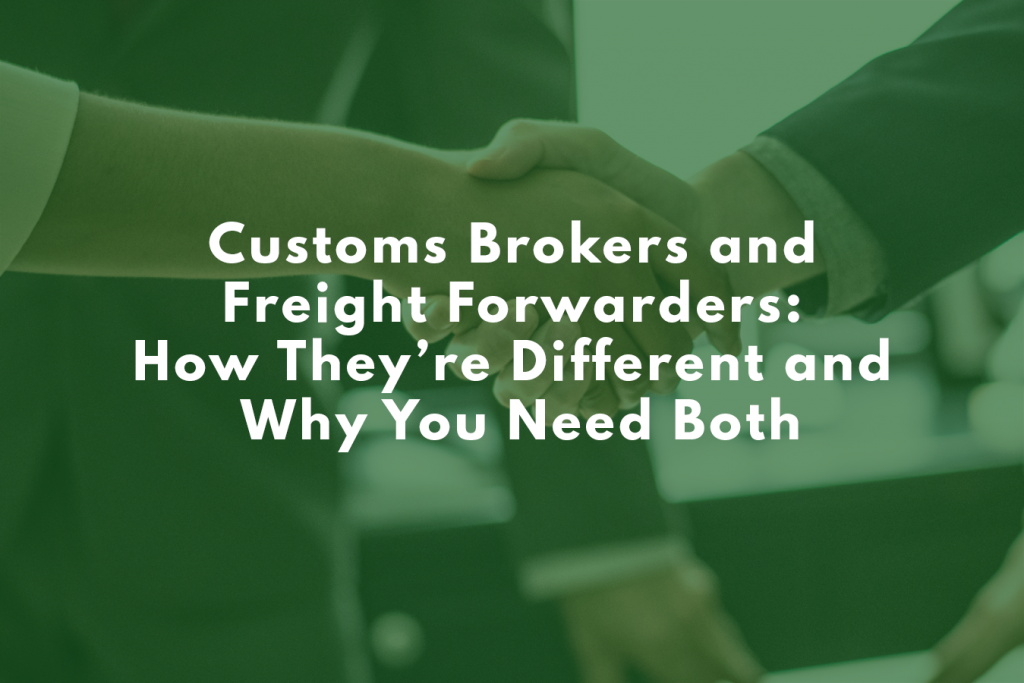Every week, we come on here and tell you about the multitude of scenarios in which customs brokers can improve the efficiency of just about any importation situation. Part of our role in what we do is to clearly define how we can facilitate getting items through, you guessed it, customs.
As such, we like to think that our job title alone gives a pretty good idea of what we do — but from time to time, however, people still confuse us with our counterparts in freight forwarding.
It’s an easy enough mistake to make as we’re both heavily involved in the importation process, but the differences between who we are and what we do are numerous.
One thing to be sure of, though, is that, for as much as there’s a distinction to be made between customs brokers and freight forwarders, having each one on your team — and for the most expertise, not just a single entity doing both jobs, but a dedicated one of each — is vital to any successful import.
First, What Are the Differences Between the Two?
Here’s how the two roles are classically defined:
- Customs brokers, such as ourselves, are licensed private individuals or collectives working in conjunction with United States Customs and Border Protection (CBP) to help importers meet the necessary requirements that will get their shipment over the U.S. border once it arrives. As per the U.S. Department of Commerce, customs brokers’ responsibilities can include overseeing product classification; customs valuation; payment of duties, taxes, and other associated fees; or any of the number of topics we discuss on this very blog.
- Freight forwarders, meanwhile, are a part of the entire journey from the supplier to you. A freight forwarding company will oversee every aspect of the supply chain by working directly with transportation companies, warehouses, and other entities to coordinate every step your shipment takes, including but not limited to:
- Booking different modes of transportation (ship, plane, truck, etc.) and arranging for tracking of freight;
- Drawing up an itinerary of arrivals and departures for each leg of travel;
- Prepping the necessary export documents to ensure compliance;
- Arranging warehouse or cargo space;
- Negotiating freight rates or any fees related to logistics; and
- Handling any insurance requirements.
You can check out our list of freight forwarders here.
Two Heads Are Better Than One
Among the thousands of freight forwarders working in the United States, many of them do offer to take on services normally allocated to a customs broker — however, in order to achieve the most efficient results, your best move is to hire both and let each set of experts work within their own wheelhouse. Here’s why:
- To have everyone playing to their strengths. Because both customs brokers and freight forwarders specialize in different areas, they come equipped with different sets of knowledge and expertise, different industry contacts, etc. Don’t compromise on that.
- To give yourself more resources than less. As much as no one likes a “too many cooks” scenario, you’ll actually be thankful to have more people (read: more connections) in your corner, working together and constantly communicating to map out the most sensible door-to-door route for your shipment.
- To not spread your resources thin. While multitasking freight forwarders likely have the resources to do both jobs, why take the risk? Instead of piling too much on one plate, share the load and save everyone the stress.
- To save yourself time, money, and patience. Because, when it comes right down to it, it’s important to complete every import with as much of these three things intact.
We can help you find the right partner to join your team — contact us today and let’s discuss every stage of your next import!






